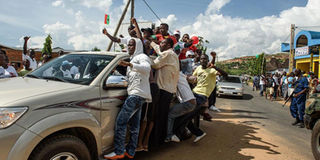Burundi charges 17 over failed coup as analysts say trouble far from over

People celebrate the return of Burundi’s President in the Kamenge quarter of Bujumbura, a ruling CNDD-FDD party stronghold, on May 16, 2015. PHOTO | JENNIFER HUXTA |
What you need to know:
- President orders an end to protests against his third term bid
- Coup leader Godefroid Niyombare, a general and ex-intelligence chief, was said to be still at large.
- Amnesty International’s Sarah Jackson also said the country was on “the brink of a human rights crisis with potentially irreversible consequences for the region.”
BUJUMBURA, Saturday
Seventeen alleged coup plotters appeared before a prosecutor in Burundi on Saturday, their lawyer said, the day after the failure of an attempt to overthrow the country’s president.
The group included General Cyrille Ndayirukiye and top police commissioners Zenon Ndabaneze and Hermenegilde Nimenya, who are accused of “attempting to overthrow the state”, lawyer Anatole Miburo said.
Coup leader Godefroid Niyombare, a general and ex-intelligence chief, was said to be still at large.
The lawyer alleged that they were beaten after their arrest on Friday, two days after Niyombare launched the bid to overthrow the president.
“They were seriously beaten, in particular General Ndayirukiye,” he said, saying the general had been forced to record a confession for broadcast on state media.
President Nkurunziza was in a confident, defiant mood as his motorcade rolled back into the capital Bujumbura following a failed coup, cheered by supporters and safely under the watch of loyalist troops who fought off the uprising.
With the plotters in detention or on the run, state radio still broadcasting the government message and independent media silenced, there was little doubt yesterday of who was in charge after two days of uncertainty.
The President was also quick to order the opposition and activists to admit defeat and end their protests against his controversial bid to stand for a third consecutive term in office.
FAR FROM OVER
Analysts and observers, however, say the crisis is not over yet, with the underlying cause — Nkurunziza’s determination to cling to power at all costs — still unresolved.
“Many Burundians are scared and continue to leave the country as fast as they can,” said Thierry Vircoulon of the International Crisis Group (ICG), a conflict prevention think-tank.
According to the United Nations, at least 100,000 people have fled the country, fearing their homeland could be plunged back into civil war less than 10 years after the last conflict ended.
“They are worried by increasing authoritarianism that marked the president’s second mandate, by the lack of social services and economic development, as well as by rising corruption,” Vircoulon said. “Nkurunziza should acknowledge that the country is in trouble and unity needs to be restored.”
Instead, however, Nkurunziza wants to press ahead with elections — seemingly confident that he now has the momentum.
“The President wishes to organise the elections as soon as possible, but attempting to do so will only contribute to worsening the situation,” Vircoulon said.
Amnesty International’s Sarah Jackson also said the country was on “the brink of a human rights crisis with potentially irreversible consequences for the region.”
There are fears that post-coup Burundi could slide into a cycle of vicious reprisals against anyone linked to the coup, including members of the army and police, protest organisers and journalists with independent media. Media rights activist have already complained of intimidation.
African Union Commission chief Nkosazana Dlamini-Zuma has called for all sides to “end all acts of violence and intimidation, respect fundamental human rights and freedoms, and engage in a genuine dialogue which will contribute to peace and stability.”




